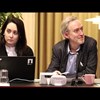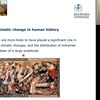cast

Research seminar - Lena Halldenius Moa Petersen: The value of cash
Research seminar with Lena Halldenius, professor of human rights studies at Lund University, and Moa Petersén, associate professor at Division of ALM and Digital Cultures at Lund University. Abstract
Divided by Memories? Beliefs about the Past, Ethnic Boundaries, and Trust in Northern Iraq.
Geopolitics, History, and International Relations 9(1), pp. 128-175. Abstract This paper examines beliefs about the past across ethnic groups in con- flict ridden Northern Iraq, and the extent to which s
The Case for Emissions Egalitarianism
Ethical Theory and Moral Practice, vol. 22, no 2., doi.org/10.1007/s10677-019-10016-8 Abstract There is a fixed limit on the greenhouse gas emissions that the atmosphere can absorb before triggering dang
Lena Halldenius & Moa Petersén: The value of cash. Economic injustice on an increasingly digitized payment market
Research seminar with Lena Halldenius, professor of human rights studies at Lund University, and Moa Petersén, associate professor at Division of ALM and Digital Cultures at Lund University. AbstractThe
Fredrik Charpentier Ljungqvist: Impacts of past climate variability – lessons for the 21st century
Place: Institute for Futures Studies, Holländargatan 13, Stockholm or onlineREGISTERResearch seminar with Fredrik Charpentier Ljungqvist, Professor of History.ABSTRACT The talk will start with summaris

Fredrik Charpentier Ljungqvist: Impacts of past climate variability – lessons for the 21st century
The talk summarizes key findings of state-of-the-art research on how climate variability and change have affected different aspects of human history in medieval and early modern Europe (c. 700–1815 CE
Childbearing of Students: The Case of Sweden
This paper examines childbearing behavior among Swedish students, and mothers’ enrolment in education in 1984-1999. The student financial aid reform in 1989 had no noticeable impact on students’ child
David Grusky: Should scholars own data? The high cost of neoliberal qualitative scholarship
Welcome to this seminar with David Grusky, Professor of Sociology at Stanford University.The seminar is jointly organized by the Institute for Analytical Sociology and the Institute for Futures Studies.D Thursday, October 6 13:00-15:00 (CET) At the Institute for Futures Studies (Holländargatan 13, Stockholm), or onlineIf qualitative work were to be rebuilt around open science principles of transparency and reproducibility, what types of institutional reforms are needed? It’s not enough to mimic open science movements within the quantitative field by focusing on problems of data archiving and reanalysis. The more fundamental problem is a legal-institutional one: The field has cut off the development of transparent, reproducible, and cumulative qualitative research by betting on a legal-institutional model in which qualitative scholars are incentivized to collect data by giving them ownership rights over them. This neoliberal model of privatized qualitative research has cut off the development of public-use data sets of the sort that have long been available for quantitative data. If a public-use form of qualitative research were supported, it would not only make qualitative research more open (i.e., transparent, reproducible, cumulative) but would also expand its reach by supporting new uses. The American Voices Project – the first nationally-representative open qualitative data set in the US – is a radical test of this hypothesis. It is currently being used to validate (or challenge!) some of the most famous findings coming out of conventional “closed” qualitative research, to serve as an “early warning system” to detect new crises and developments in the U.S., to build new approaches to taking on poverty, the racial wealth gap, and other inequities, and to monitor public opinion in ways far more revealing than conventional forced-choice surveys. The purpose of this talk is to discuss the promise – and pitfalls – of this new open-science form of qualitative research as well as opportunities to institutionalize it across the world.
Logistics, Power, Possible Futures: A Teach-in Connecting the Nordics, Europe, and the Middle East
Venue: Biblioteket, Hägerstensåsens medborgarhusFor more information och information på svenska, visit the Facebook event here > Why should we care about logistics? How do we connect struggles around
Time to plan for the worst-case scenario
After two of the most damaging hurricanes in history affected the Gulf of Mexico just a few days apart, the impact of climate-induced catastrophes is finally getting some attention. However, in truth,








